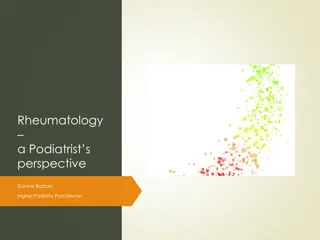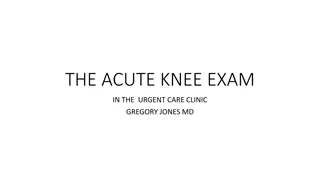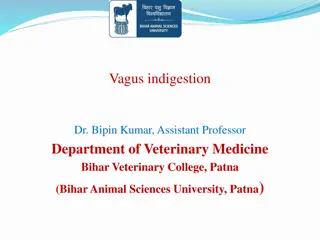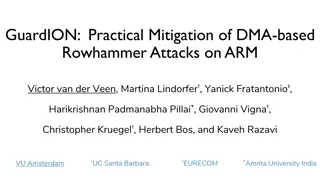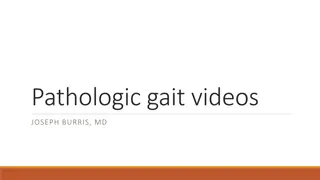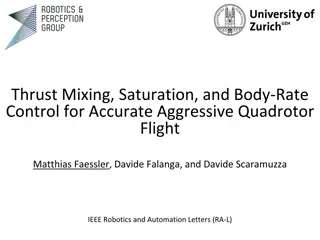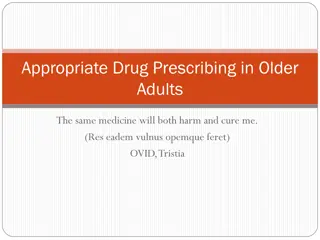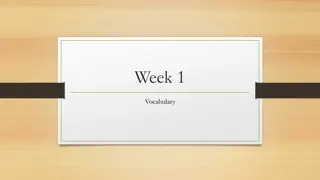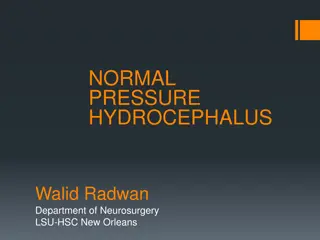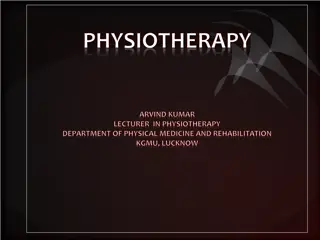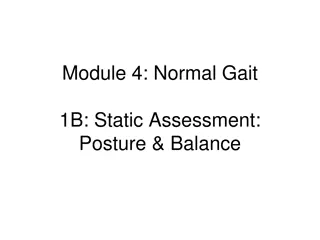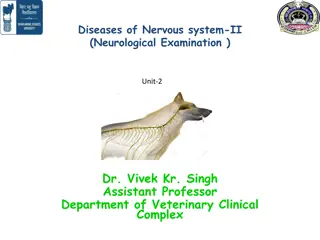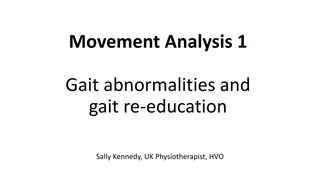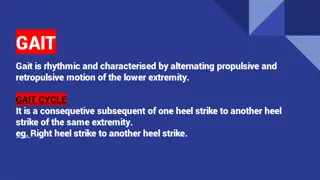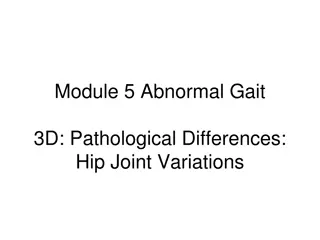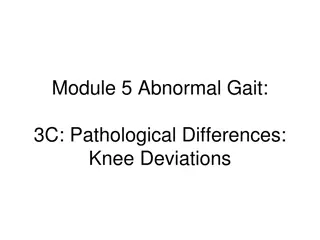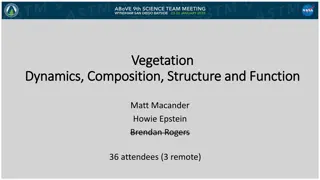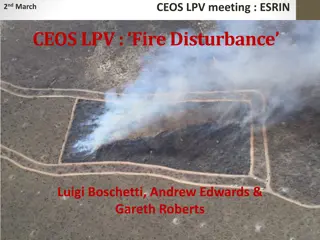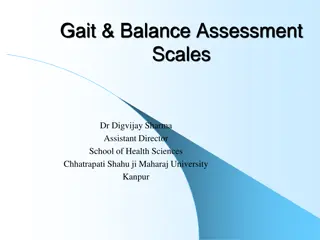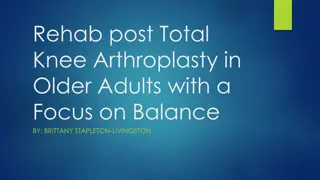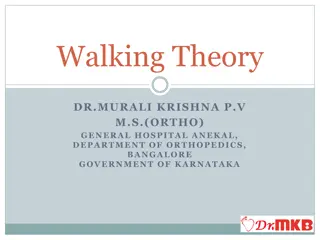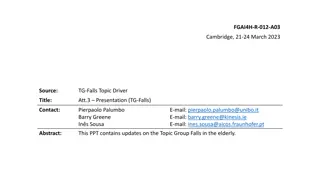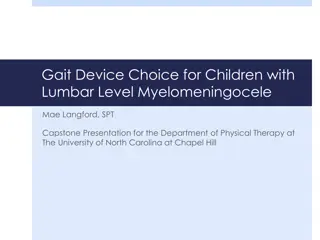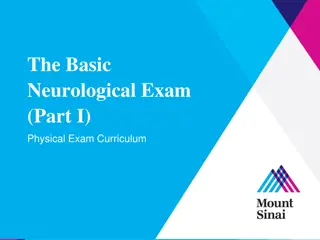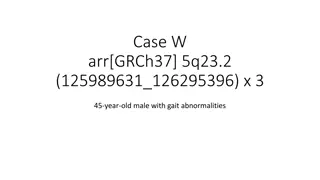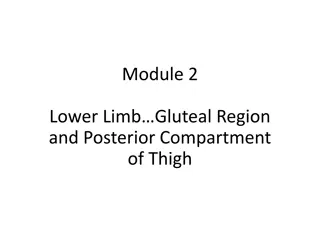2023 Southwest UT Disturbance
NERC and WECC Staff Report on the disturbance that occurred on April 10, 2023, in Southwest Utah. The report provides an overview, causes of reduction, findings, and key takeaways with recommendations.
0 views • 9 slides
Musculoskeletal System Assessment Guidelines
Learn how to conduct a thorough musculoskeletal system assessment, including functional assessments and physical examination guidelines. Explore assessment techniques for ADLs, gait observation, joint palpation, muscle strength testing, and more in nursing practice.
1 views • 17 slides
PHYSIOTHERAPY IN KNEE JOINT INJURIES
Explore the anatomy of the knee joint, common knee injuries like meniscus tears and ACL ruptures, and the role of physiotherapy in treatment and rehabilitation. Learn about exercises, gait training, and post-surgical care for knee injuries.
2 views • 12 slides
Understanding the Paradox of Plankton and Biodiversity Correlates
The paradox of plankton challenges the theory that the number of species should match available resources, as seen in diverse plankton ecosystems. Explanations include resource partitioning, temporal and spatial heterogeneity, predation, adaptation to disturbance, and evolutionary processes. Biodive
3 views • 40 slides
Comprehensive School and Community Treatment Outcomes for Youth 2023 Legislative Update
The Comprehensive School and Community Treatment (CSCT) Program aims to support high-risk students behaviorally, socially, emotionally, and academically. The program provides individualized mental health services, enhances social and academic skills, and offers counseling to parents/families. CSCT t
0 views • 20 slides
Podiatrist's Role in Managing Foot Involvement in Rheumatic Diseases
Rheumatology encompasses over 200 conditions affecting the musculoskeletal system, with foot involvement being significant in conditions like RA and OA. Podiatrists play a crucial role in diagnosing, treating, and preventing foot problems associated with inflammatory arthritis, such as joint damage,
0 views • 20 slides
Comprehensive Overview of Morse Fall Scale and Its Application in Preventing Falls
Falls among hospitalized patients pose a significant risk, with 30-50% resulting in injuries. The Morse Fall Scale (MFS) is a widely used method to assess fall risk, comprising six variables with predictive validity. Factors such as history of falling, ambulatory aids, gait, and mental status are cr
0 views • 13 slides
Comprehensive Guide to Acute Knee Examination in Urgent Care
This detailed guide covers the essential components of the acute knee exam conducted in an urgent care setting by Dr. Gregory Jones, including chief complaints, anatomy, examination techniques, ligament assessments, practical aspects, and more. The examination process involves assessing functional l
1 views • 27 slides
Understanding Vagal Indigestion in Ruminants: Causes and Types
Vagal indigestion in ruminants is a functional disturbance affecting the fore stomachs, leading to symptoms like rumen distention, inappetence, bradycardia, and more. It is not a specific disease but a syndrome with various underlying causes such as injury, inflammation, or mechanical obstruction. T
1 views • 14 slides
Mitigation of DMA-based Rowhammer Attacks on ARM
Practical strategies are presented in "GuardION: Practical Mitigation of DMA-based Rowhammer Attacks on ARM" to defend against Rowhammer attacks on ARM architecture. The paper discusses Rowhammer defenses, RAMPAGE attacks on Android OS, and introduces GuardION as a lightweight mitigation approach. I
0 views • 48 slides
Law Enforcement's Response to Mental Health Crisis Intervention
Law enforcement agencies have established Emotionally Disturbed Persons Response Teams (EDPRT) and Crisis Intervention Teams (CIT) to address mental health crises in the community. These specially trained officers handle situations involving emotionally disturbed individuals, suicidal persons, psych
0 views • 13 slides
Understanding Different Types and Classifications of Heliports
Heliports, helidecks, helistops, and helipads serve as key landing areas for helicopters. They come in various classifications including military, federal, private use, public use, commercial service, and personal use. Factors influencing site selection include traffic considerations, obstruction av
0 views • 21 slides
Overview of Pathologic Gait Patterns for Clinical Reference
Explore a comprehensive collection of videos and images demonstrating various pathologic gait patterns exhibited in patients with different lower extremity weaknesses and neurological conditions. From steppage gait to Parkinsonian gait, each video provides a visual insight into the distinct characte
0 views • 19 slides
Advanced Techniques for Quadrotor Flight Control
The research paper discusses thrust mixing, saturation, and body-rate control for precise and aggressive quadrotor flight. It covers system overview, dynamical system modeling, LQR control design, trajectory tracking performance, disturbance rejection, body torque estimation, and iterative thrust mi
0 views • 14 slides
Managing Microbiological Quality in Pharmaceutical Environments
The quality of microbiological products is influenced by the pharmaceutical environment materials. Good Manufacturing Practices (GMP) play a crucial role in minimizing contamination risks. Various sources of contamination include the atmosphere, water, persons, raw materials, packaging, buildings, a
0 views • 128 slides
Understanding Azoturia in Horses: Causes, Symptoms, and Treatment
Azoturia, also known as exertional rhabdomyolysis or tying-up syndrome, is a multifactorial myopathy that mainly affects draft horses. It is characterized by stiffness in gait, reluctance to move, lameness, and myoglobinuria. The disease typically occurs during exercise after a period of rest and ca
0 views • 14 slides
The Mystery of the Talking Fan
An electric fan starts making strange sounds, hinting at a hidden message. The poet cannot decipher the fan's chatter until someone oils its motor, silencing the mystery. The fan's disturbance in the air produces strong airflow. In a whimsical conversation between a fan and a mechanic, the fan reque
0 views • 5 slides
Appropriate Drug Prescribing in Older Adults: Balancing Harm and Cure
Understanding age-related changes in pharmacokinetics and pharmacodynamics is crucial for appropriate drug prescribing in older adults. Recognizing high-risk medications to avoid, understanding common drug interactions, and conducting regular drug list reviews are key components in providing safe an
1 views • 47 slides
Understanding Functional GI Disorders: A Comprehensive Overview
Functional GI disorders encompass a range of conditions affecting the gastrointestinal system, such as irritable bowel syndrome and disorders of the gut-brain interaction. These disorders are characterized by no structural abnormalities but are influenced by factors like motility disturbance, viscer
0 views • 42 slides
Vocabulary Exploration Week 1: Words and Definitions
Dive into the world of vocabulary with Week 1's words and their meanings. Work with a partner to discuss terms like "swell," "aspect," "navigation," "submerge," "porthole," "anxiety," "cultural," "rampart," "tight-fisted," and "gait." Explore the nuances and applications of each word through engagin
0 views • 16 slides
Understanding Normal Pressure Hydrocephalus: Clinical Features and Diagnosis
Normal Pressure Hydrocephalus (NPH) is a condition characterized by the classic triad of dementia, urinary incontinence, and gait disturbance. Learn about the history, types, diagnostic studies, and presentation of NPH, along with differentiating it from other diseases. Discover the current standard
0 views • 30 slides
Introduction to Physiotherapy: Modalities and Exercise Therapy
Physiotherapy, a branch of medical science, utilizes various modalities like electric current, heat/cold, water, and exercises for therapeutic treatment. It includes exercise therapy with active and passive movements, electrotherapy, thermotherapy, hydrotherapy, and massage. Active movements involve
4 views • 42 slides
Understanding Posture, Balance, and Gait Analysis in Human Movement
This resource delves into the static assessment of posture and balance, exploring the various inputs and control mechanisms involved in maintaining standing posture. It discusses the key factors influencing posture, such as visual, somatosensory, proprioceptive, and vestibular systems, along with mu
0 views • 51 slides
Comprehensive Guide to Neurological Examination in Dogs and Cats
Neurological examination in dogs and cats is crucial for diagnosing nervous system disorders. This guide covers the recording of history, general and detailed clinical examinations, examination of CSF, radiographic examination, EEG, and brain biopsy. It includes assessing history, mental state, move
0 views • 20 slides
Understanding Gait Abnormalities and Re-Education: A Comprehensive Analysis by Sally Kennedy
Sally Kennedy, a UK physiotherapist, explores gait abnormalities common in older individuals and those with neurological conditions. The content delves into the stages of the normal gait cycle, from initial contact to mid-swing, highlighting the importance of identifying and managing common gait pro
0 views • 21 slides
Understanding the Phases of Gait Cycle
Gait is a rhythmic motion of the lower extremities characterized by alternating propulsive and retropulsive movements. The Gait Cycle consists of Swing Phase and Stance Phase, each crucial for walking efficiency. Stance Phase is further divided into stages like Initial Contact, Loading Response, Mid
0 views • 20 slides
Pathological Differences in Hip Joint Variations: Abnormal Gait Analysis
Understanding pathological gait variations related to hip joint differences is crucial in gait analysis. Excessive sagittal, coronal, and transverse plane motions impact stance and swing phases, leading to deviations in gait patterns. Excess flexion, limited flexion, past retraction, excess adductio
0 views • 13 slides
Understanding Pathological Knee Variations in Gait Analysis
Explore different knee deviations in gait analysis, such as limited knee flexion, knee hyperextension, extensor thrust, and excess knee flexion. Learn how these deviations disrupt normal gait patterns, impact muscle demands, and affect shock absorption during various phases of the gait cycle.
1 views • 19 slides
Insights into Vegetation Dynamics and Function in Ecosystems
Explore the complexities of vegetation dynamics, composition, structure, and function in various ecosystems through discussions on disturbance, wetlands, hydrology, and ecosystem services. Engage in ongoing dialogues about vegetation classification schemas and practical methods like traits mapping t
0 views • 9 slides
Understanding RowPress: A New Read Disturbance Phenomenon in Modern DRAM Chips
Demonstrating and analyzing RowPress, a novel read disturbance phenomenon causing bitflips in DRAM chips. Different from RowHammer vulnerability, RowPress showcases effective solutions on real Intel systems with DRAM chips.
0 views • 46 slides
CEOS LPV Fire Disturbance Products Overview
CEOS LPV Fire Disturbance products play a crucial role in monitoring and validating active fire and burned area datasets. The current status highlights the validation protocols in place for reference data generation, product inter-comparisons, and the need for validation information for multiple use
0 views • 9 slides
Understanding Gait and Balance Assessment in Elderly
Balance in elderly individuals is essential to prevent falls and injuries. Disorders of balance can lead to difficulties in posture maintenance, walking, and dizziness. Neural components play a crucial role in postural control, involving sensory processes, central processing, and effector components
0 views • 59 slides
Rehab Post Total Knee Arthroplasty in Older Adults with a Focus on Balance
This presentation focuses on the impact of osteoarthritis in older adults, key components of rehabilitation post Total Knee Arthroplasty (TKA), falls risk, evidence-based balance improvement interventions, and the importance of supervision in rehab programs. It discusses the common locations and cau
0 views • 30 slides
Decoding the Dynamics of Walking: An In-depth Exploration
Walking is a fundamental yet complex phenomenon that plays a crucial role in our daily lives. Despite its significance, the science behind how we walk is often overlooked in education and healthcare. This article delves into the various aspects of walking, from muscle actions to gait analysis, shedd
0 views • 46 slides
Advances in Fall Risk Assessment and Management for Older Adults
This presentation delves into updates on the stratification tool for fall risk in community-dwelling older adults, emphasizing the importance of early intervention through opportunistic health visits. It discusses a decision tree model for assessing fall risk, highlighting the significance of histor
0 views • 12 slides
Gait Device Selection for Children with Lumbar Level Myelomeningocele
This presentation discusses the considerations and choices of gait devices for children with lumbar level myelomeningocele. It covers the specific needs of pediatric patients, benefits and drawbacks of various devices, funding requirements, and clinical application through case studies. The material
0 views • 31 slides
Understanding Genu Valgum: Causes, Symptoms, Diagnosis, and Treatment
Genu valgum, also known as knock knees, is characterized by inward angulation of the legs at the knee joint. This condition can arise from various factors such as rickets, growth imbalances, muscle weakness, injuries, and more. Symptoms include visual separation of the ankles, altered gait, and pote
0 views • 6 slides
Comprehensive Guide to Neurological Exams
This guide provides a detailed overview of neurological exams, focusing on components such as cognition, motor function, and cranial nerves. It covers essential aspects like mental status, reflexes, sensation, and gait assessment. The importance of thorough examination in primary care settings is em
0 views • 29 slides
Evaluation of Genetic Abnormalities in a 45-Year-Old Male with Gait Abnormalities
A 45-year-old male with gait abnormalities was referred for evaluation, with an unknown inheritance and deceased parents. His father had a history of ataxia and tremor. Using the GAIN scoring metric, the genomic content was assessed, including the presence of protein-coding genes, established TS gen
0 views • 24 slides
Comprehensive Study of Lower Limb Anatomy and Function
Explore the detailed anatomy of the gluteal region, posterior compartment of the thigh, blood vessels, nerves, and muscles of the lower limb. Learn about dermatomes, communication areas, muscle actions, Trendelenburg gait, and more. This educational resource is part of a pedorthic program of study f
0 views • 14 slides





